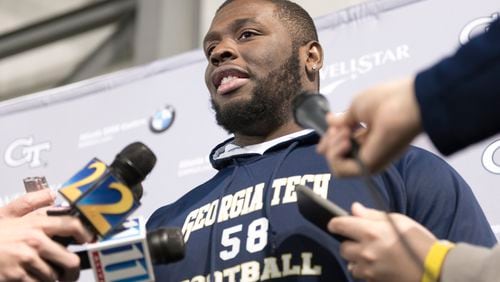In 11 seasons, Georgia Tech coach Paul Johnson’s offense did more than help the Yellow Jackets finish first or second in the ACC Coastal Division seven times and go to two Orange Bowls. Johnson’s option offense became the team’s identity.
So much so that, as athletic director Todd Stansbury conducts the search for his successor, whether Tech should continue with the same scheme through the hire of a member of the Johnson coaching tree seems a valid point to consider.
Stansbury doesn’t seem tied to it, and his reported interview with Los Angeles Chargers offensive coordinator (and Tech grad) Ken Whisenhunt would indicate as much.
“I would say more along the lines, at Georgia Tech, you’ve got to be an innovator,” Stansbury said Wednesday. “I think it’s part of the DNA of the institute. I’m more interested in the thinking behind whatever it is they want to do or why they want to do it and how they see that as giving us an advantage. So that’s more what I’m interested in than maybe identifying one system or another that may give us that advantage.”
Among former players who ran Johnson’s scheme, there’s some support for keeping it while others would be O.K. with a different tactic. Former offensive lineman Will Jackson is among the former. To him, the scheme isn’t holding Tech back. Rather, it’s overarching factors such as recruiting or administrative support.
“It’s a successful offense,” Jackson said. “The offense is probably averaging close to 30 points a game over (Johnson’s) tenure.”
Jackson said he would be all for the hire of Army coach Jeff Monken or Kennesaw State coach Brian Bohannon, both of whom coached at Tech for Johnson.
“Those guys are young, can come in with energy and can recruit, which is obviously important,” he said.
David Sims, a former B-back who is now an assistant coach at Furman, could see the benefit of hiring someone like Monken or Bohannon, but doesn’t see it as the only route. He was supportive of the possibility of Clemson co-offensive coordinator Tony Elliott, who had previously coached at Furman. Sims and Elliott didn’t overlap, but they have mutual colleagues.
“They say he’s a tremendous guy, a really good coach, has a really good feel for young people,” Sims said. “And he recruits Georgia, so that definitely helps.”
Sims acknowledged that switching schemes could be a painful transition.
“We’ll just have to be open to that and know that whoever you bring in (as recruits), they’ll have to be ready to play right away and (fans will have to) just kind of live with the results of them learning and taking their lumps early on,” Sims said.
But, Sims also said that a switch away could be a help to recruiting. For instance, where Tech has typically recruited taller receivers, a new scheme might open up a wider range of possibilities. Where the option offense spreads out rushing attempts more broadly among backs, another scheme might be more appealing to running backs who want to be featured more prominently, Sims suggested.
“Tech is a really, really good job that I think can be a sleeping giant, especially with the area,” Sims said. “We have all this talent in Georgia.”
Former center Freddie Burden said that Elliott would be a great choice for Tech.
“I’ve followed him through his career a little bit and I’m pretty familiar with him,” Burden said. “I know he’s a hell of a recruiter, and he can relate to kids, being younger. For that reason, I think he would be great for Tech.”
Burden recognized the need for recruiting different types of players with a different scheme, but, like Sims, said that “I think some kids will be more open to pursuing Tech just for that reason.”
Synjyn Days, who played quarterback, A-back and B-back for the Jackets, did not have a particular preference for staying with the option versus going to a different offense. He shared Sims’ point that a switch in offenses would require rebuilding with different types of players and bodies. He echoed what Stansbury said – an innovator.
“That’s my big thing,” he said.
Phil Smith, who played three seasons on the offensive line before leaving as a grad transfer to play at UCF, strongly endorsed Alabama offensive line coach Brent Key. Smith was recruited to UCF by Key, who was a four-year starter (1997-2000) for the Jackets during the George O’Leary era, and also had Key as his position coach. Smith called him the best recruiter that he dealt with either as a grad transfer or as a high-school prospect. He said that Key was an excellent position coach and tactician and engaged on a personal level with players. He added that, while Key’s title was offensive line coach, he served as a de facto offensive coordinator.
“Coach Key is great about utilizing the talent that he has, the skills that his guys have and putting them in great position to succeed,” Smith said.







